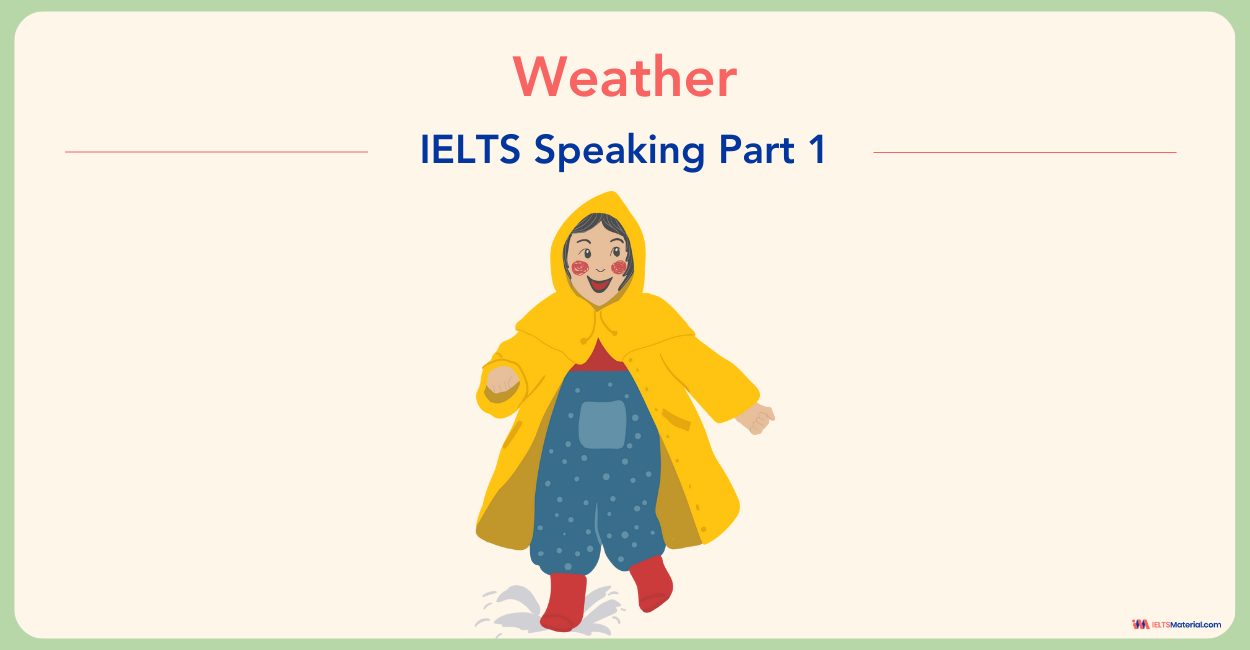Weather IELTS Speaking Part 1 Sample Answer
Table of Contents
Get a Complimentary IELTS Speaking Strategies PDF
In this blog on Weather IELTS Speaking Part 1, you’ll face questions related to weather/climate. On this steady note, to let you know about IELTS Speaking Part 1 the examiner will begin by introducing themselves and asking you to introduce yourself. This is typically a brief warm-up to get you comfortable with the speaking test. You’ll be asked about your name, where you’re from, and other basic personal information.
You will be asked a series of questions on common topics. You have to state your opinion or experiences. Given below are real IELTS Speaking Part 1 questions with sample answers on the subject of ‘Weather.’
Aiming for a high Speaking IELTS Band Score ? Take a look at the expert tips and tricks below!
Weather IELTS Speaking Part 1 Questions
Now that you’ve got a clear idea of how the test works let’s get right into the main area of focus. For the topic ‘Weather IELTS Speaking Part 1,’ you’ll be asked questions like:
1. What’s the weather like in your country?
In my country, the weather is quite diverse due to the varying topography and climatic zones. Generally, the northern regions experience a continental climate with hot summers and freezing winters, while the coastal areas have a more moderate maritime climate. However, climate change has led to increasingly unpredictable weather patterns in recent years.
2. Do you prefer hot or cold weather?
Personally, I prefer milder weather conditions over extreme heat or cold. While I enjoy the warmth of summer, excessive heat can be quite draining. On the other hand, I find cold weather invigorating, but only to a certain extent. Extreme cold can be challenging to deal with.
3. How does the weather affect your daily life?
The weather plays a significant role in my daily routine. For instance, during hot summer days, I tend to stay indoors more and rely on air conditioning. In contrast, during the cooler months, I enjoy spending time outdoors and engaging in outdoor activities like hiking or picnicking.
4. Do you think the weather has an impact on people’s moods?
Absolutely! I believe the weather can profoundly influence our emotions and overall mood. Sunny, pleasant weather tends to uplift our spirits and make us feel more energetic and positive. Conversely, gloomy, rainy days can dampen our mood and make us feel lethargic or melancholic.
5. What’s your favorite type of weather?
My favorite type of weather is a warm, sunny day with a gentle breeze and a few fluffy clouds in the sky. This kind of weather is perfect for outdoor activities, picnics, or simply relaxing in the park or backyard.
6. How do you typically dress for different weather conditions?
For hot weather, I typically wear lightweight, breathable fabrics like cotton or linen to stay cool and comfortable. In cold weather, I layer up with warm sweaters, coats, and scarves to insulate against the chill. And for rainy days, I make sure to have a waterproof jacket or umbrella on hand.
7. Have you ever experienced extreme weather conditions?
Yes, I have experienced some extreme weather conditions. A few years ago, my region was hit by a severe heatwave, with temperatures soaring above 40°C (104°F) for several consecutive days. It was incredibly challenging to cope with the intense heat, and we had to take precautions to stay hydrated and avoid heat exhaustion.
Here are the types of questions that are asked during IELTS Speaking Part 1
8. Do you think climate change is affecting the weather patterns in your area?
Definitely. Climate change has had a noticeable impact on the weather patterns in my area. We’ve been experiencing more frequent and intense heat waves, as well as unpredictable rainfall patterns. Extreme weather events, such as severe storms and flooding, have also become more common in recent years.
9. How do you stay informed about the weather forecast?
I typically check the weather forecast daily using various online sources or mobile apps. These resources provide detailed information on temperature, precipitation, wind conditions, and any severe weather alerts or warnings. Staying informed about the weather helps me plan my activities and be prepared for any potential disruptions.
10. Do you enjoy outdoor activities that are weather-dependent?
Yes, I love engaging in outdoor activities, many of which are heavily influenced by the weather conditions. For example, I enjoy hiking and camping, but these activities are best done during mild, dry weather. Similarly, water sports like swimming or boating are more enjoyable on warm, sunny days. Adapting to the weather is crucial for making the most of outdoor pursuits.
When speaking, your tone will clarify and convey meaning. To learn how to effectively utilize a good tone and gain a high Speaking band, check out IELTS Speaking Test –Tone
Eager to brush up on your speaking skills with the ‘Weather’ IELTS Speaking topic? Book a FREE trial to practice!
Weather IELTS Speaking Part 1 Vocabulary
- Climate: The weather conditions prevailing in an area over a long period of time.
Example: The tropical climate of the island is characterized by warm temperatures and high humidity throughout the year.
- Unpredictable: Not able to be predicted or foreseen with certainty.
Example: The unpredictable nature of the stock market makes it a risky investment for many.
- Invigorating: Giving new life and energy.
Example: The invigorating mountain air rejuvenated the hikers after their long trek.
- Melancholic: Feeling or expressing sadness or depression.
Example: The melancholic tone of the poem reflected the author’s grief over the loss of a loved one.
- Breeze: A gentle wind.
Example: The refreshing breeze from the ocean provided relief from the summer heat.
- Insulate: To protect from the effects of weather, heat, or cold.
Example: Proper insulation in the walls and attic can help insulate a home from extreme temperatures.
- Precautions: Measures taken in advance to prevent something undesirable from happening.
Example: Taking precautions such as wearing a helmet and protective gear is essential for safe cycling.
- Disruptions: Interruptions or disturbances that disrupt the normal flow or course of something.
Example: The flight delays caused significant disruptions to travelers’ schedules.
- Pursuits: Activities or interests that someone engages in or follows.
Example: Hiking and photography are two of her favorite outdoor pursuits.
- Topography: The study of the physical features of an area, including its relief and elevation.
Example: The rugged topography of the mountain range made it challenging for the explorers to navigate.
IELTSMaterial is Here to Help You Grab a Band 9 in IELTS Speaking
The IELTS Speaking test involves more than just being fluent and confident. You are expected to express your ideas concisely, use a variety of language, and proper grammar. Achieving all these on your own by just practising test papers might be a little challenging. So, you can connect with our IELTS experts or join the FREE webinars for tips to take your IELTS Speaking preparation to the next level.
Also Check:
Bonus IELTS Speaking part questions with Answers
Explore other Speaking Part 1 Topics
Kasturika Samanta

Janice Thompson

Janice Thompson
Recent Articles
Janice Thompson

Kasturika Samanta
Kasturika Samanta





Post your Comments
1 Comment